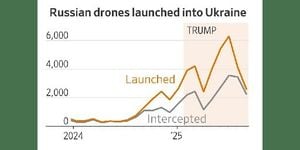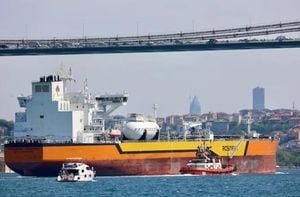On February 21, 2025, extensive public transportation strikes are set to disrupt services across Germany, spearheaded by the union ver.di. Commuters from various states will face significant challenges as buses, trams, and trains halt operations due to labor disputes.
The strikes are primarily concentrated in Baden-Württemberg, where services operated by the Stuttgarter Straßenbahnen AG (SSB) will cease all operations for the day. Commuters have been advised to seek alternative routes, including carpooling, cycling, or working from home if possible.
"Buses and trains of the SSB, as well as the cable car and the on-demand service SSB Flex, will not operate," stated SSB spokesperson on February 20. The disruptions will not only affect intercity travel but also local transit, with several private bus companies joining the action.
Problems will arise significantly for working individuals and students who rely heavily on public transport to reach their workplaces and schools. The strikes coincide with protest actions across various sectors of public service, including waste disposal and water services, to press for improved working conditions and adequate compensation. The union is demanding increased wages and additional holidays to make the public transport profession more attractive.
According to the union's announcements, cities like Stuttgart will see complete standstill with night buses also halted on the eve of the strikes. Affected attendees are encouraged to utilize the electronic scheduling services to stay informed on which routes are operational amid the strike chaos.
Ver.di's decision to organize these strikes follows failed negotiations during the second round of tariff talks with employers, where no satisfactory offers were made. Jan Bleckert from ver.di highlighted the dire situation for workers, stating, "With already inadequate staff, it is infeasible to expand public transport services." There’s widespread concern as these labor disputes are causing public frustration and considerable disruption.
Similar strikes are planned to affect cities across other federal states. Areas like Berlin, Mecklenburg-Vorpommern, and North Rhine-Westphalia are also poised to experience significant disruptions, impacting thousands. All forms of transport services including buses, subways, and trams across multiple locations, such as Karlsruhe, Freiburg, Heilbronn, and others, will witness widespread failures, with some cities expecting minimal service operational.
On the same day, Berlin authorities have announced public reports stating, "The workers’ rights must be respected, and the escalated strikes come as a result of continued employer neglect during negotiations." The municipal services, already stretched, are likely to face additional burdens as they attempt to manage the demands arising from the strikes.
The situation has drawn protests from various community groups, with many calling for solidarity with the workers during these turbulent times. Public attendees at demonstrations during the strikes are expected to be high, potentially complicate traffic flows, and creating challenges for those seeking to attend the protests or affected events like sporting matches throughout the strike timeframe.
This strike also serves as a litmus test for how local governments and transport authorities manage labor relations moving forward, particularly as similar strikes and disruptions seem likely to affect other sectors and regions as negotiations falter.
Ver.di's calls for support have also highlighted the absence of concrete resolutions during the current negotiations, emphasizing the increasing urgency within both management and labor to address these concerns effectively.
The labor disputes strike deeply at the heart of transit operations, and the repercussions are being felt widely across various demographics, emphasizing the pressing need for dialogue and solutions between public services and their employees.
With the situation rapidly developing, commuters are advised to stay updated on amendments to schedules and potential additional information through local transit authorities and ver.di channels as they navigate their journeys on what promises to be, quite literally, challenging days for public transport across Germany.



